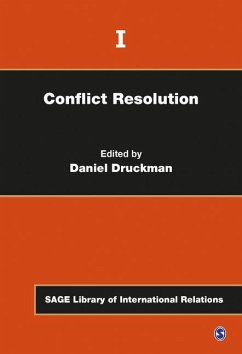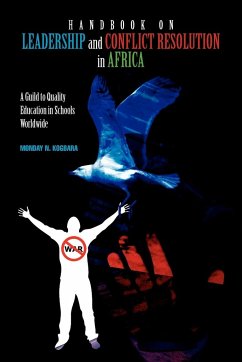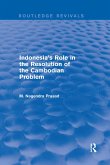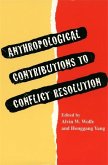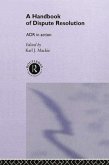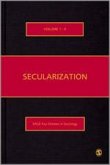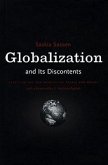- Broschiertes Buch
- Merkliste
- Auf die Merkliste
- Bewerten Bewerten
- Teilen
- Produkt teilen
- Produkterinnerung
- Produkterinnerung
How international conflict might be managed or resolved is a major focal point of a very large and growing body of scholarly research. This five volume set provides an intellectual history to the fields of conflict management and resolution as well as some of the best contemporary research on the subject. Incorporating over 80 articles, the volumes also include a number of classic works that have been critical in setting the conceptual and theoretical underpinnings of research today. The result is a wide-ranging collection encompassing many topics and streams of research over several decades…mehr
Andere Kunden interessierten sich auch für
![Unarmed Heroes: The Courage to Go Beyond Violence: Personal Testimonies and Essays on the Peaceful Resolution of Conflict Unarmed Heroes: The Courage to Go Beyond Violence: Personal Testimonies and Essays on the Peaceful Resolution of Conflict]() Unarmed Heroes: The Courage to Go Beyond Violence: Personal Testimonies and Essays on the Peaceful Resolution of Conflict22,99 €
Unarmed Heroes: The Courage to Go Beyond Violence: Personal Testimonies and Essays on the Peaceful Resolution of Conflict22,99 €![Handbook on Leadership and Conflict Resolution in Africa Handbook on Leadership and Conflict Resolution in Africa]() Monday KogbaraHandbook on Leadership and Conflict Resolution in Africa24,99 €
Monday KogbaraHandbook on Leadership and Conflict Resolution in Africa24,99 €![Indonesia's Role in the Resolution of the Cambodian Problem Indonesia's Role in the Resolution of the Cambodian Problem]() M. Nagendra PrasadIndonesia's Role in the Resolution of the Cambodian Problem64,99 €
M. Nagendra PrasadIndonesia's Role in the Resolution of the Cambodian Problem64,99 €![Anthropological Contributions to Conflict Resolution Anthropological Contributions to Conflict Resolution]() Anthropological Contributions to Conflict Resolution30,99 €
Anthropological Contributions to Conflict Resolution30,99 €![A Handbook of Dispute Resolution A Handbook of Dispute Resolution]() A Handbook of Dispute Resolution75,99 €
A Handbook of Dispute Resolution75,99 €![Secularization Secularization]() Secularization1.408,99 €
Secularization1.408,99 €![Globalization and Its Discontents Globalization and Its Discontents]() Saskia SassenGlobalization and Its Discontents19,99 €
Saskia SassenGlobalization and Its Discontents19,99 €-
-
-
How international conflict might be managed or resolved is a major focal point of a very large and growing body of scholarly research. This five volume set provides an intellectual history to the fields of conflict management and resolution as well as some of the best contemporary research on the subject. Incorporating over 80 articles, the volumes also include a number of classic works that have been critical in setting the conceptual and theoretical underpinnings of research today. The result is a wide-ranging collection encompassing many topics and streams of research over several decades from a number of disciplinary heritages including political science, social psychology and economics. Topical coverage includes but is not limited to theories of conflict, evaluation methods, crisis management, negotiation, mediation, peacekeeping, intervention as well as articles on implementation and long term resolution Part I: Theory and Concepts Part II: Methods and Evaluation Part III: Techniques/Approaches Part IV: Long Term Resolution
Hinweis: Dieser Artikel kann nur an eine deutsche Lieferadresse ausgeliefert werden.
Hinweis: Dieser Artikel kann nur an eine deutsche Lieferadresse ausgeliefert werden.
Produktdetails
- Produktdetails
- Verlag: Sage Publications
- Five-Volume Set edition
- Seitenzahl: 2076
- Erscheinungstermin: 29. Juni 2006
- Englisch
- Gewicht: 3817g
- ISBN-13: 9781412921879
- ISBN-10: 1412921872
- Artikelnr.: 21291754
- Herstellerkennzeichnung
- Libri GmbH
- Europaallee 1
- 36244 Bad Hersfeld
- gpsr@libri.de
- Verlag: Sage Publications
- Five-Volume Set edition
- Seitenzahl: 2076
- Erscheinungstermin: 29. Juni 2006
- Englisch
- Gewicht: 3817g
- ISBN-13: 9781412921879
- ISBN-10: 1412921872
- Artikelnr.: 21291754
- Herstellerkennzeichnung
- Libri GmbH
- Europaallee 1
- 36244 Bad Hersfeld
- gpsr@libri.de
Daniel Druckman is a 2004-2005 visiting Professor at the University of Queensland′s Australian Centre for Peace and Conflict Studies in Brisbane, Australia. He is the Vernon M. and Minnie I. Lynch Professor of Conflict Resolution at George Mason University in Fairfax, Virginia, where he has coordinated the doctoral program at the Institute for Conflict Analysis and Resolution (ICAR). He is also a member of the faculty at Sabanci University in Istanbul, Turkey and has held senior positions at several consulting firms, as well as at the U.S. National Academy of Sciences. He received a Ph.D. from Northwestern University and was awarded a best-in-field prize from the American Institutes for Research for his doctoral dissertation. He has published widely (approximately 150 publications, including 12 authored or edited books) on such topics as negotiating behavior, nationalism and group identity, human performance, peacekeeping, political stability, nonverbal communication, and methodology (including simulation). He serves as a board member or associate editor for eight Journals. He received the 1995 Otto Klineberg award for Intercultural and International Relations from the Society for the Psychological Analysis of Social Issues for his work on nationalism, a Teaching Excellence award in 1998 from George Mason University, and an award for the outstanding article published in 2001 from the International Association for Conflict Management. He is the recipient of the 2003 Lifetime Achievement award from the International Association for Conflict Management. Paul F.Diehl is Professor of Political Science at University of Illinois at Urbana-Champaign, USA
PART ONE: THEORY AND CONCEPTS Origins of the Field The Analysis of Social Conflict - R W Mack and R C Snyder Toward an Overview and Synthesis Some Conceptual Difficulties in the Theory of Social Conflict - C F Fink The Development of the Conflict Resolution Field - L Kriesberg Key Concepts and Distinctions Types of Conflict Competition and Dissensus - V Aubert Two Types of Conflict and of Conflict Resolution New Directions in Research on Conflict Resolution - K Hammond A Cognitive Interaction Model to Analyze Culture Conflict in International Relations - E S Glenn, R H Johnson, P R Kimmel and B Wedge Conflict of Interest and Value Dissensus - D Druckman and K Zechmeister Propositions in the Sociology of Conflict Stages of Conflict Resolution Re-Conceptualizing Conflict Resolution as a Three-Stage Process - B Walter Group and National Identity Isolation and Collaboration - H Guetzkow A Partial Theory of Inter-Nation Relations Origins and Effects of Group Ethnocentrism and Nationalism - P C Rosenblatt Nationalism, Patriotism, and Group Loyalty - D Druckman A Social Psychological Perspective Relative Deprivation Relative Deprivation as a Key Social Psychological Concept - T F Pettigrew Interdependence and Strategic Interaction Bargaining, Communication and Limited War - T C Schelling Effective Choice in the Prisoner
s Dilemma - R Axelrod Theory of Moves - S J Brams Boundary Roles A Behavioral Theory of Labor Negotiations - R E Walton and R B McKersie The Structure and Dynamics of Behaviour in the Organizational Boundary Roles - J S Adams Boundary Role Conflict - D Druckman Negotiation as Dual Responsiveness Diplomacy and Domestic Politics - R Putnam The Logic of Two-Level Games Ripeness and Hurting Stalemates The Right Moment - C Mitchell Notes on Four Models of Ripeness Ripeness - I W Zartman (2000) The Hurting Stalemate and Beyond Responsiveness The Norm of Reciprocity - A W Gouldner Stability and Sudden Change in Interpersonal and International Affairs - D G Pruitt When Does Reciprocity in the Actions of Nations Occur? - M Patchen PART TWO: METHODS AND EVALUATION Standards of Evaluation Evaluating Peacekeeping Missions - D Druckman and P C Stern Conflict Management in Enduring Rivalries - G Goertz and P Regan Evaluating Interventions in History - P C Stern and D Druckman The Case of International Conflict Resolution Evaluation Issues in Peace Implementation - G Downs and S Stedman Methodological Approaches Simulation, Experimentation, and Context - R B Mahoney and D Druckman Dimensions of Design and Inference Third-Party Intervention - N B McGillicuddy, G L Welton and D G Pruitt A Field Experiment Comparing Three Different Models Determinants of Compromising Behavior in Negotiation - D Druckman A Meta-Analysis Finding Harbingers of Violent Conflict - P Brecke Using Pattern Recognition to Anticipate Conflicts PART THREE: TECHNIQUES/APPROACHES Early Warning and Preventive Diplomacy Early Warning and Preventive Diplomacy - M Lund Crisis Bargaining When Will They Ever Learn - R Leng Coercive Bargaining in Recurrent Crises Signaling Versus the Balance of Power and Interests - J Fearon An Empirical Test of the Crisis Bargaining Model Peacekeeping International Peacekeeping and Conflict Resolution - P Diehl, D Druckman and J Wall Where Do Peacekeepers Go? Mediation - M Gilligan and S Stedman Definitional/Conceptual Intermediaries - O R Young Additional Thoughts on Third Parties Origins Devious Objectives and the Disputants
View of International Mediation - O Richmond A Theoretical Framework Who Mediates? The Political Economy of International Conflict Management - J Bercovitch and G Schneider Stepping Into the Fray - JM Greig When Do Mediators Mediate? Process Why Do They Do It Like This? An Analysis of the Factors Influencing Mediation Behaviour in International Conflicts - J Bercovitch and A Houston Moments of Opportunity - J M Greig Recognizing Conditions of Ripeness for International Mediation Between Enduring Rivals Which Side are You On? Bias, Credibility and Mediation - A Kydd and B Walter An Event Data Analysis of Third-Party Mediation - P A Schrodt and D J Gerner Outcomes The Nature of the Dispute and the Effectiveness on International Mediation - J Bercovitch and J Langley Understanding Success and Failure of International Mediation - M Kleiboer Mediating International Crises - J Wilkenfeld et al Cross-National and Experimental Perspectives Culture Social and Political Cultural Effects on the Outcomes of Mediation in Militarized Interstate Disputes - R Leng and P Regan Adaptive Third Parties in a Cultural Milieu - P J Carnevale et al Community Mediation in the People
s Republic of China - J A Wall and M Blum Democracy and the Peaceful Settlement of International Conflict - W Dixon Negotiation Frameworks Bargaining and Negotiation in International Relations - J Sawyer and H Guetzkow Two Paradigms of Negotiation - P T Hopmann Relational Frames and Their Ethical Implications in International Negotiation - Bargaining and Problem SolvingW A Donohue and G D Hoobler An Analysis Based on the Oslo II Negotiations Stages The Peaceful Settlement of Industrial and Intergroup Disputes - A Douglas Stages, Crises and Turning Points - D Druckman Negotiating Military Base Rights, Spain and the United States Process Negotiation as a Learning Process - J G Cross An Application of a Richardson Process Model - P T Hopmann and T C Smith Soviet-American Interactions in the Test-Ban negotiations, 1062-1963 Negotiating Strategic Arms Control, 1969-1979 - L Jensen Turning Points in International Negotiation - D Druckman A Comparative Analysis Outcomes Development of Integrative Solutions in Bilateral Negotiation - D G Pruitt and S A Lewis Culture Some Determinants of Reactions to Procedural Models of Conflict Resolution - K Leung A Cross-National Study Explorations of Negotiations in Ten Foreign Cultures Using a Model Developed in the United States - J L Graham, A T Minyu and W Rodgers Cultural Dimensions of Negotiation - P J Carnevale and K Leung Interactive Conflict Resolution The Problem-Solving Workshop in Conflict Resolution - H C Kelman Third-Party Consultation as a Method of Conflict Resolution - R J Fisher A Review of Studies Legal Decisions to Use the International Court of Justice - D Fischer Four Recent Cases Capacity, Commitment and Compliance - B Simmons International Institutions and Territorial Disputes Intervention and Military Force Conditions of Successful Third-Party Intervention in Intrastate Conflicts - P Regan Possible and Impossible Solutions to Ethnic Civil Wars - C Kaufman PART FOUR: LONG TERM RESOLUTION Implementation of Agreements Spoiler Problems in Peace Processes - S Stedman The Precarious Nature of Peace - S Werner Resolving the Issues, Enforcing the Settlement and Renegotiating the Terms Reconciliation/Transformation Conflict Transformation in Protracted Internal Conflicts - J P Lederach The Case for a Comprehensive Framework Long-Term Stability Does Peacekeeping Keep Peace? International Intervention and the Duration of Peace after Civil War - VP Fortna Keeping the Peace After Secessions: Territorial Conflict between Rump and Secessionist States - J Tir International Peacebuilding - M Doyle and N Sambanis A Theoretical and Quantitative Analysis
s Dilemma - R Axelrod Theory of Moves - S J Brams Boundary Roles A Behavioral Theory of Labor Negotiations - R E Walton and R B McKersie The Structure and Dynamics of Behaviour in the Organizational Boundary Roles - J S Adams Boundary Role Conflict - D Druckman Negotiation as Dual Responsiveness Diplomacy and Domestic Politics - R Putnam The Logic of Two-Level Games Ripeness and Hurting Stalemates The Right Moment - C Mitchell Notes on Four Models of Ripeness Ripeness - I W Zartman (2000) The Hurting Stalemate and Beyond Responsiveness The Norm of Reciprocity - A W Gouldner Stability and Sudden Change in Interpersonal and International Affairs - D G Pruitt When Does Reciprocity in the Actions of Nations Occur? - M Patchen PART TWO: METHODS AND EVALUATION Standards of Evaluation Evaluating Peacekeeping Missions - D Druckman and P C Stern Conflict Management in Enduring Rivalries - G Goertz and P Regan Evaluating Interventions in History - P C Stern and D Druckman The Case of International Conflict Resolution Evaluation Issues in Peace Implementation - G Downs and S Stedman Methodological Approaches Simulation, Experimentation, and Context - R B Mahoney and D Druckman Dimensions of Design and Inference Third-Party Intervention - N B McGillicuddy, G L Welton and D G Pruitt A Field Experiment Comparing Three Different Models Determinants of Compromising Behavior in Negotiation - D Druckman A Meta-Analysis Finding Harbingers of Violent Conflict - P Brecke Using Pattern Recognition to Anticipate Conflicts PART THREE: TECHNIQUES/APPROACHES Early Warning and Preventive Diplomacy Early Warning and Preventive Diplomacy - M Lund Crisis Bargaining When Will They Ever Learn - R Leng Coercive Bargaining in Recurrent Crises Signaling Versus the Balance of Power and Interests - J Fearon An Empirical Test of the Crisis Bargaining Model Peacekeeping International Peacekeeping and Conflict Resolution - P Diehl, D Druckman and J Wall Where Do Peacekeepers Go? Mediation - M Gilligan and S Stedman Definitional/Conceptual Intermediaries - O R Young Additional Thoughts on Third Parties Origins Devious Objectives and the Disputants
View of International Mediation - O Richmond A Theoretical Framework Who Mediates? The Political Economy of International Conflict Management - J Bercovitch and G Schneider Stepping Into the Fray - JM Greig When Do Mediators Mediate? Process Why Do They Do It Like This? An Analysis of the Factors Influencing Mediation Behaviour in International Conflicts - J Bercovitch and A Houston Moments of Opportunity - J M Greig Recognizing Conditions of Ripeness for International Mediation Between Enduring Rivals Which Side are You On? Bias, Credibility and Mediation - A Kydd and B Walter An Event Data Analysis of Third-Party Mediation - P A Schrodt and D J Gerner Outcomes The Nature of the Dispute and the Effectiveness on International Mediation - J Bercovitch and J Langley Understanding Success and Failure of International Mediation - M Kleiboer Mediating International Crises - J Wilkenfeld et al Cross-National and Experimental Perspectives Culture Social and Political Cultural Effects on the Outcomes of Mediation in Militarized Interstate Disputes - R Leng and P Regan Adaptive Third Parties in a Cultural Milieu - P J Carnevale et al Community Mediation in the People
s Republic of China - J A Wall and M Blum Democracy and the Peaceful Settlement of International Conflict - W Dixon Negotiation Frameworks Bargaining and Negotiation in International Relations - J Sawyer and H Guetzkow Two Paradigms of Negotiation - P T Hopmann Relational Frames and Their Ethical Implications in International Negotiation - Bargaining and Problem SolvingW A Donohue and G D Hoobler An Analysis Based on the Oslo II Negotiations Stages The Peaceful Settlement of Industrial and Intergroup Disputes - A Douglas Stages, Crises and Turning Points - D Druckman Negotiating Military Base Rights, Spain and the United States Process Negotiation as a Learning Process - J G Cross An Application of a Richardson Process Model - P T Hopmann and T C Smith Soviet-American Interactions in the Test-Ban negotiations, 1062-1963 Negotiating Strategic Arms Control, 1969-1979 - L Jensen Turning Points in International Negotiation - D Druckman A Comparative Analysis Outcomes Development of Integrative Solutions in Bilateral Negotiation - D G Pruitt and S A Lewis Culture Some Determinants of Reactions to Procedural Models of Conflict Resolution - K Leung A Cross-National Study Explorations of Negotiations in Ten Foreign Cultures Using a Model Developed in the United States - J L Graham, A T Minyu and W Rodgers Cultural Dimensions of Negotiation - P J Carnevale and K Leung Interactive Conflict Resolution The Problem-Solving Workshop in Conflict Resolution - H C Kelman Third-Party Consultation as a Method of Conflict Resolution - R J Fisher A Review of Studies Legal Decisions to Use the International Court of Justice - D Fischer Four Recent Cases Capacity, Commitment and Compliance - B Simmons International Institutions and Territorial Disputes Intervention and Military Force Conditions of Successful Third-Party Intervention in Intrastate Conflicts - P Regan Possible and Impossible Solutions to Ethnic Civil Wars - C Kaufman PART FOUR: LONG TERM RESOLUTION Implementation of Agreements Spoiler Problems in Peace Processes - S Stedman The Precarious Nature of Peace - S Werner Resolving the Issues, Enforcing the Settlement and Renegotiating the Terms Reconciliation/Transformation Conflict Transformation in Protracted Internal Conflicts - J P Lederach The Case for a Comprehensive Framework Long-Term Stability Does Peacekeeping Keep Peace? International Intervention and the Duration of Peace after Civil War - VP Fortna Keeping the Peace After Secessions: Territorial Conflict between Rump and Secessionist States - J Tir International Peacebuilding - M Doyle and N Sambanis A Theoretical and Quantitative Analysis
PART ONE: THEORY AND CONCEPTS Origins of the Field The Analysis of Social Conflict - R W Mack and R C Snyder Toward an Overview and Synthesis Some Conceptual Difficulties in the Theory of Social Conflict - C F Fink The Development of the Conflict Resolution Field - L Kriesberg Key Concepts and Distinctions Types of Conflict Competition and Dissensus - V Aubert Two Types of Conflict and of Conflict Resolution New Directions in Research on Conflict Resolution - K Hammond A Cognitive Interaction Model to Analyze Culture Conflict in International Relations - E S Glenn, R H Johnson, P R Kimmel and B Wedge Conflict of Interest and Value Dissensus - D Druckman and K Zechmeister Propositions in the Sociology of Conflict Stages of Conflict Resolution Re-Conceptualizing Conflict Resolution as a Three-Stage Process - B Walter Group and National Identity Isolation and Collaboration - H Guetzkow A Partial Theory of Inter-Nation Relations Origins and Effects of Group Ethnocentrism and Nationalism - P C Rosenblatt Nationalism, Patriotism, and Group Loyalty - D Druckman A Social Psychological Perspective Relative Deprivation Relative Deprivation as a Key Social Psychological Concept - T F Pettigrew Interdependence and Strategic Interaction Bargaining, Communication and Limited War - T C Schelling Effective Choice in the Prisoner
s Dilemma - R Axelrod Theory of Moves - S J Brams Boundary Roles A Behavioral Theory of Labor Negotiations - R E Walton and R B McKersie The Structure and Dynamics of Behaviour in the Organizational Boundary Roles - J S Adams Boundary Role Conflict - D Druckman Negotiation as Dual Responsiveness Diplomacy and Domestic Politics - R Putnam The Logic of Two-Level Games Ripeness and Hurting Stalemates The Right Moment - C Mitchell Notes on Four Models of Ripeness Ripeness - I W Zartman (2000) The Hurting Stalemate and Beyond Responsiveness The Norm of Reciprocity - A W Gouldner Stability and Sudden Change in Interpersonal and International Affairs - D G Pruitt When Does Reciprocity in the Actions of Nations Occur? - M Patchen PART TWO: METHODS AND EVALUATION Standards of Evaluation Evaluating Peacekeeping Missions - D Druckman and P C Stern Conflict Management in Enduring Rivalries - G Goertz and P Regan Evaluating Interventions in History - P C Stern and D Druckman The Case of International Conflict Resolution Evaluation Issues in Peace Implementation - G Downs and S Stedman Methodological Approaches Simulation, Experimentation, and Context - R B Mahoney and D Druckman Dimensions of Design and Inference Third-Party Intervention - N B McGillicuddy, G L Welton and D G Pruitt A Field Experiment Comparing Three Different Models Determinants of Compromising Behavior in Negotiation - D Druckman A Meta-Analysis Finding Harbingers of Violent Conflict - P Brecke Using Pattern Recognition to Anticipate Conflicts PART THREE: TECHNIQUES/APPROACHES Early Warning and Preventive Diplomacy Early Warning and Preventive Diplomacy - M Lund Crisis Bargaining When Will They Ever Learn - R Leng Coercive Bargaining in Recurrent Crises Signaling Versus the Balance of Power and Interests - J Fearon An Empirical Test of the Crisis Bargaining Model Peacekeeping International Peacekeeping and Conflict Resolution - P Diehl, D Druckman and J Wall Where Do Peacekeepers Go? Mediation - M Gilligan and S Stedman Definitional/Conceptual Intermediaries - O R Young Additional Thoughts on Third Parties Origins Devious Objectives and the Disputants
View of International Mediation - O Richmond A Theoretical Framework Who Mediates? The Political Economy of International Conflict Management - J Bercovitch and G Schneider Stepping Into the Fray - JM Greig When Do Mediators Mediate? Process Why Do They Do It Like This? An Analysis of the Factors Influencing Mediation Behaviour in International Conflicts - J Bercovitch and A Houston Moments of Opportunity - J M Greig Recognizing Conditions of Ripeness for International Mediation Between Enduring Rivals Which Side are You On? Bias, Credibility and Mediation - A Kydd and B Walter An Event Data Analysis of Third-Party Mediation - P A Schrodt and D J Gerner Outcomes The Nature of the Dispute and the Effectiveness on International Mediation - J Bercovitch and J Langley Understanding Success and Failure of International Mediation - M Kleiboer Mediating International Crises - J Wilkenfeld et al Cross-National and Experimental Perspectives Culture Social and Political Cultural Effects on the Outcomes of Mediation in Militarized Interstate Disputes - R Leng and P Regan Adaptive Third Parties in a Cultural Milieu - P J Carnevale et al Community Mediation in the People
s Republic of China - J A Wall and M Blum Democracy and the Peaceful Settlement of International Conflict - W Dixon Negotiation Frameworks Bargaining and Negotiation in International Relations - J Sawyer and H Guetzkow Two Paradigms of Negotiation - P T Hopmann Relational Frames and Their Ethical Implications in International Negotiation - Bargaining and Problem SolvingW A Donohue and G D Hoobler An Analysis Based on the Oslo II Negotiations Stages The Peaceful Settlement of Industrial and Intergroup Disputes - A Douglas Stages, Crises and Turning Points - D Druckman Negotiating Military Base Rights, Spain and the United States Process Negotiation as a Learning Process - J G Cross An Application of a Richardson Process Model - P T Hopmann and T C Smith Soviet-American Interactions in the Test-Ban negotiations, 1062-1963 Negotiating Strategic Arms Control, 1969-1979 - L Jensen Turning Points in International Negotiation - D Druckman A Comparative Analysis Outcomes Development of Integrative Solutions in Bilateral Negotiation - D G Pruitt and S A Lewis Culture Some Determinants of Reactions to Procedural Models of Conflict Resolution - K Leung A Cross-National Study Explorations of Negotiations in Ten Foreign Cultures Using a Model Developed in the United States - J L Graham, A T Minyu and W Rodgers Cultural Dimensions of Negotiation - P J Carnevale and K Leung Interactive Conflict Resolution The Problem-Solving Workshop in Conflict Resolution - H C Kelman Third-Party Consultation as a Method of Conflict Resolution - R J Fisher A Review of Studies Legal Decisions to Use the International Court of Justice - D Fischer Four Recent Cases Capacity, Commitment and Compliance - B Simmons International Institutions and Territorial Disputes Intervention and Military Force Conditions of Successful Third-Party Intervention in Intrastate Conflicts - P Regan Possible and Impossible Solutions to Ethnic Civil Wars - C Kaufman PART FOUR: LONG TERM RESOLUTION Implementation of Agreements Spoiler Problems in Peace Processes - S Stedman The Precarious Nature of Peace - S Werner Resolving the Issues, Enforcing the Settlement and Renegotiating the Terms Reconciliation/Transformation Conflict Transformation in Protracted Internal Conflicts - J P Lederach The Case for a Comprehensive Framework Long-Term Stability Does Peacekeeping Keep Peace? International Intervention and the Duration of Peace after Civil War - VP Fortna Keeping the Peace After Secessions: Territorial Conflict between Rump and Secessionist States - J Tir International Peacebuilding - M Doyle and N Sambanis A Theoretical and Quantitative Analysis
s Dilemma - R Axelrod Theory of Moves - S J Brams Boundary Roles A Behavioral Theory of Labor Negotiations - R E Walton and R B McKersie The Structure and Dynamics of Behaviour in the Organizational Boundary Roles - J S Adams Boundary Role Conflict - D Druckman Negotiation as Dual Responsiveness Diplomacy and Domestic Politics - R Putnam The Logic of Two-Level Games Ripeness and Hurting Stalemates The Right Moment - C Mitchell Notes on Four Models of Ripeness Ripeness - I W Zartman (2000) The Hurting Stalemate and Beyond Responsiveness The Norm of Reciprocity - A W Gouldner Stability and Sudden Change in Interpersonal and International Affairs - D G Pruitt When Does Reciprocity in the Actions of Nations Occur? - M Patchen PART TWO: METHODS AND EVALUATION Standards of Evaluation Evaluating Peacekeeping Missions - D Druckman and P C Stern Conflict Management in Enduring Rivalries - G Goertz and P Regan Evaluating Interventions in History - P C Stern and D Druckman The Case of International Conflict Resolution Evaluation Issues in Peace Implementation - G Downs and S Stedman Methodological Approaches Simulation, Experimentation, and Context - R B Mahoney and D Druckman Dimensions of Design and Inference Third-Party Intervention - N B McGillicuddy, G L Welton and D G Pruitt A Field Experiment Comparing Three Different Models Determinants of Compromising Behavior in Negotiation - D Druckman A Meta-Analysis Finding Harbingers of Violent Conflict - P Brecke Using Pattern Recognition to Anticipate Conflicts PART THREE: TECHNIQUES/APPROACHES Early Warning and Preventive Diplomacy Early Warning and Preventive Diplomacy - M Lund Crisis Bargaining When Will They Ever Learn - R Leng Coercive Bargaining in Recurrent Crises Signaling Versus the Balance of Power and Interests - J Fearon An Empirical Test of the Crisis Bargaining Model Peacekeeping International Peacekeeping and Conflict Resolution - P Diehl, D Druckman and J Wall Where Do Peacekeepers Go? Mediation - M Gilligan and S Stedman Definitional/Conceptual Intermediaries - O R Young Additional Thoughts on Third Parties Origins Devious Objectives and the Disputants
View of International Mediation - O Richmond A Theoretical Framework Who Mediates? The Political Economy of International Conflict Management - J Bercovitch and G Schneider Stepping Into the Fray - JM Greig When Do Mediators Mediate? Process Why Do They Do It Like This? An Analysis of the Factors Influencing Mediation Behaviour in International Conflicts - J Bercovitch and A Houston Moments of Opportunity - J M Greig Recognizing Conditions of Ripeness for International Mediation Between Enduring Rivals Which Side are You On? Bias, Credibility and Mediation - A Kydd and B Walter An Event Data Analysis of Third-Party Mediation - P A Schrodt and D J Gerner Outcomes The Nature of the Dispute and the Effectiveness on International Mediation - J Bercovitch and J Langley Understanding Success and Failure of International Mediation - M Kleiboer Mediating International Crises - J Wilkenfeld et al Cross-National and Experimental Perspectives Culture Social and Political Cultural Effects on the Outcomes of Mediation in Militarized Interstate Disputes - R Leng and P Regan Adaptive Third Parties in a Cultural Milieu - P J Carnevale et al Community Mediation in the People
s Republic of China - J A Wall and M Blum Democracy and the Peaceful Settlement of International Conflict - W Dixon Negotiation Frameworks Bargaining and Negotiation in International Relations - J Sawyer and H Guetzkow Two Paradigms of Negotiation - P T Hopmann Relational Frames and Their Ethical Implications in International Negotiation - Bargaining and Problem SolvingW A Donohue and G D Hoobler An Analysis Based on the Oslo II Negotiations Stages The Peaceful Settlement of Industrial and Intergroup Disputes - A Douglas Stages, Crises and Turning Points - D Druckman Negotiating Military Base Rights, Spain and the United States Process Negotiation as a Learning Process - J G Cross An Application of a Richardson Process Model - P T Hopmann and T C Smith Soviet-American Interactions in the Test-Ban negotiations, 1062-1963 Negotiating Strategic Arms Control, 1969-1979 - L Jensen Turning Points in International Negotiation - D Druckman A Comparative Analysis Outcomes Development of Integrative Solutions in Bilateral Negotiation - D G Pruitt and S A Lewis Culture Some Determinants of Reactions to Procedural Models of Conflict Resolution - K Leung A Cross-National Study Explorations of Negotiations in Ten Foreign Cultures Using a Model Developed in the United States - J L Graham, A T Minyu and W Rodgers Cultural Dimensions of Negotiation - P J Carnevale and K Leung Interactive Conflict Resolution The Problem-Solving Workshop in Conflict Resolution - H C Kelman Third-Party Consultation as a Method of Conflict Resolution - R J Fisher A Review of Studies Legal Decisions to Use the International Court of Justice - D Fischer Four Recent Cases Capacity, Commitment and Compliance - B Simmons International Institutions and Territorial Disputes Intervention and Military Force Conditions of Successful Third-Party Intervention in Intrastate Conflicts - P Regan Possible and Impossible Solutions to Ethnic Civil Wars - C Kaufman PART FOUR: LONG TERM RESOLUTION Implementation of Agreements Spoiler Problems in Peace Processes - S Stedman The Precarious Nature of Peace - S Werner Resolving the Issues, Enforcing the Settlement and Renegotiating the Terms Reconciliation/Transformation Conflict Transformation in Protracted Internal Conflicts - J P Lederach The Case for a Comprehensive Framework Long-Term Stability Does Peacekeeping Keep Peace? International Intervention and the Duration of Peace after Civil War - VP Fortna Keeping the Peace After Secessions: Territorial Conflict between Rump and Secessionist States - J Tir International Peacebuilding - M Doyle and N Sambanis A Theoretical and Quantitative Analysis

